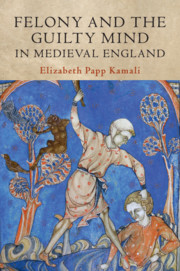Book contents
- Felony and the Guilty Mind in Medieval England
- Studies in Legal History
- Felony and the Guilty Mind in Medieval England
- Copyright page
- Dedication
- Contents
- Figures
- Acknowledgments
- A Note on the Text
- Abbreviations
- Introduction
- Part I Felonia Felonice Facta: Felony and Intentionality
- Part II Þe Deuylys Doghtyr of Hellë Fyre: Felony and Emotion
- Part III Handlyng Synne: Guilt and Innocence
- 5 Confession and Circumstantial Inquiry
- 6 Guilt Assessment
- Part IV Dies Iræ: Judge and Jury
- Conclusion
- Bibliography
- Index
6 - Guilt Assessment
from Part III - Handlyng Synne: Guilt and Innocence
Published online by Cambridge University Press: 18 July 2019
- Felony and the Guilty Mind in Medieval England
- Studies in Legal History
- Felony and the Guilty Mind in Medieval England
- Copyright page
- Dedication
- Contents
- Figures
- Acknowledgments
- A Note on the Text
- Abbreviations
- Introduction
- Part I Felonia Felonice Facta: Felony and Intentionality
- Part II Þe Deuylys Doghtyr of Hellë Fyre: Felony and Emotion
- Part III Handlyng Synne: Guilt and Innocence
- 5 Confession and Circumstantial Inquiry
- 6 Guilt Assessment
- Part IV Dies Iræ: Judge and Jury
- Conclusion
- Bibliography
- Index
Summary
In order to explore how juries sorted the guilty from the innocent, Chapter 6 compares and contrasts the rankings of sins and crimes in medieval English legal, religious, and literary texts. It demonstrates the way in which sins were commonly divided into offenses of thought, speech, and deed, and explores how theologians and others understood the importance of volition or free will in aggravating or mitigating the severity of an offense. The chapter explores the treatment of theft and homicide in legal treatises and literary and penitential texts as well in order to make sense of how juries determined who should walk free and who should hang for such offenses.
- Type
- Chapter
- Information
- Felony and the Guilty Mind in Medieval England , pp. 199 - 242Publisher: Cambridge University PressPrint publication year: 2019

